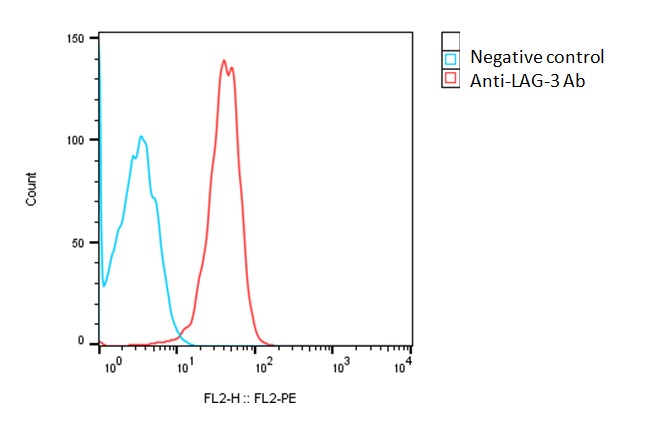
| Catalog Number | Product | Size | Price | |
|---|---|---|---|---|
| C3051 | Human LAG-3-CHO-K1 Stable Cell Line | 2 vials | $4950 | Order |
| Catalog Number | C3051 |
|---|---|
| Cell Line Name | Human LAG-3-CHO-K1 Stable Cell Line |
| Accession Number | NP_002277.4 |
| Host Cell | Adherent CHO-K1 |
| Quantity | Two vials of frozen cells (2x106 per vial) |
| Culture Medium | DMEM with 10% FBS, 4 µg/ml puromycin |
| Freezing Medium | 90% FBS and 10% DMSO |
| Storage | Liquid nitrogen upon receipt |
| Product Datasheet: | Download PDF |
Detection of human LAG3 expression on human LAG3-CHO-K1 stable cells using a PE anti-human LAG3 antibody (BioLegend, Cat. #369305).

LAG-3 (Lymphocyte-activation gene 3) is a protein receptor in the immunoglobulin superfamily expressed on various immune cells. LAG-3 interacts with major histocompatibility complex class II (MHC-II) molecules on antigen-presenting cells (APCs) to regulate T cell activation and tolerance. By binding to MHC-II, LAG-3 can negatively regulate the activation and proliferation of T cells, promoting immune tolerance and preventing excessive immune responses. LAG-3 is involved in maintaining immune homeostasis and preventing autoimmunity. The expression of LAG-3 in cancer is often upregulated in tumor-infiltrating lymphocytes (TILs) and exhausted T cells within the tumor microenvironment leading to immune dysfunction and impaired antitumor immune responses. Tumor cells may exploit the LAG-3 pathway to evade immune surveillance and promote immune tolerance, thereby facilitating tumor growth and metastasis. The unique property of LAG-3 as an immune checkpoint molecule has led to its exploration as a potential therapeutic target in cancer immunotherapy.
Woo SR, Turnis ME, Goldberg MV, et al. Immune inhibitory molecules LAG-3 and PD-1 synergistically regulate T-cell function to promote tumoral immune escape. Cancer Res. 72:917-927.2012
Maruhashi T, Sugiura D, Okazaki IM, et al. LAG-3 inhibits the activation of CD4+ T cells that recognize stable pMHCII through its conformation-dependent recognition of pMHCII. Nat Immunol. 19:1415-1426.2018.
Andrews LP, Cillo AR, Karapetyan L, Kirkwood JM, Workman CJ, Vignali DAA. Molecular Pathways and Mechanisms of LAG3 in Cancer Therapy. Clin Cancer Res. 28:5030-5039. 2022.